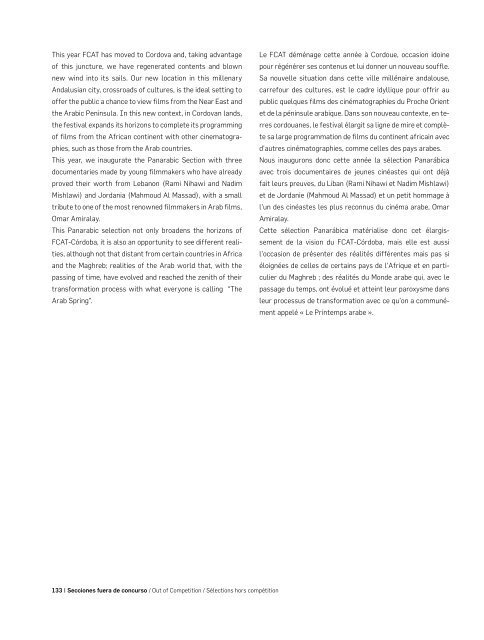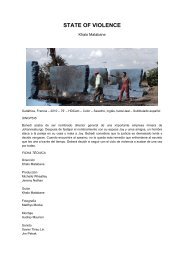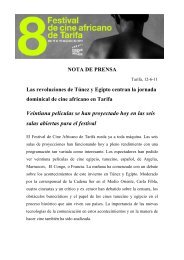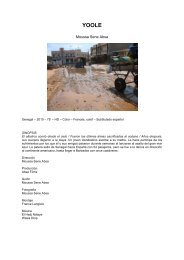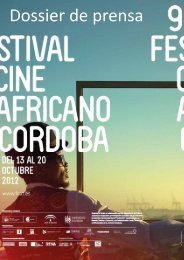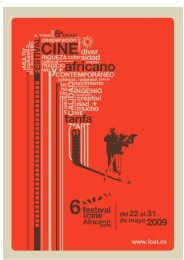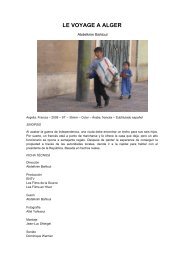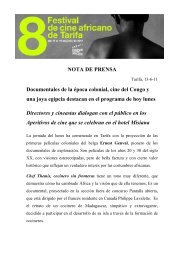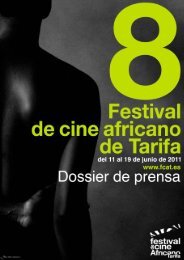- Page 1 and 2:
3 | Introducción / Introduction
- Page 3 and 4:
7. Colaboradores del festival / Par
- Page 5 and 6:
9. Sesiones especiales / Special Se
- Page 7 and 8:
Noches del festival Sojo Café Ribe
- Page 9 and 10:
Jesús Hernández Jihan El Tahri Jo
- Page 11 and 12:
Premios Awards Prix 13 | Introducci
- Page 13 and 14:
Griot for Best Feature Film Griot f
- Page 15 and 16:
El sueño africano The African Drea
- Page 17 and 18:
Tanya Valette Nació en República
- Page 19 and 20:
21 | Jurado / Jury
- Page 21 and 22:
Al otro lado del Estrecho & África
- Page 23 and 24:
Ishtar Yasin Gutiérrez Dramaturga,
- Page 25 and 26:
27 | Jurado / Jury
- Page 27 and 28:
29 | Introducción / Introduction A
- Page 29 and 30:
The Andalusian Screenwriters’ Ass
- Page 31 and 32:
Manuel Ángel Jiménez Arévalo Tit
- Page 33 and 34:
35 | Jurados especiales / Special j
- Page 35 and 36:
SIGNIS Jury SIGNIS came into being
- Page 37 and 38:
39 | Jurados especiales / Special j
- Page 39 and 40:
Consuelo Serrano (Cruz Roja) Licenc
- Page 41 and 42:
José Santofimia (KASUMAY) Profesor
- Page 43 and 44:
Iván Barrón (ELMAT) Diplomado en
- Page 45 and 46:
47 | Jurados especiales / Special j
- Page 47 and 48:
El sueño africano Largometrajes de
- Page 49 and 50:
678 CAIRO 678 LES FEMMES DU BUS 678
- Page 51 and 52:
MATIÈRE GRISE MATERIA GRIS GREY MA
- Page 53 and 54:
SKOONHEID BELLEZA BEAUTY Sudáfrica
- Page 55 and 56:
SUR LA PLANCHE EN EL FILO ON THE ED
- Page 57 and 58:
EL TAAIB EL ARREPENTIDO THE REPENTA
- Page 59 and 60:
TEY HOY AUJOURD’HUI TODAY Senegal
- Page 61 and 62:
VIRGEM MARGARIDA VIRGIN MARGARIDA V
- Page 63 and 64:
Al otro lado del Estrecho Largometr
- Page 65 and 66:
BIR D’EAU, UN WALKMOVIE PORTRAIT
- Page 67 and 68:
THE EDUCATION OF AUMA OBAMA LA EDUC
- Page 69 and 70:
ESPOIR- VOYAGE ESPERANZA-VIAJE HOPE
- Page 71 and 72:
GANGSTER PROJECT PROYECTO GÁNSTER
- Page 73 and 74:
ICI ON NOIE LES ALGÉRIENS - 17 OCT
- Page 75 and 76:
LAÏCITÉ INCH’ALLAH! LAICIDAD IN
- Page 77 and 78:
LA VIERGE, LES COPTES ET MOI LA VIR
- Page 79 and 80: África en Corto Cortometrajes Afri
- Page 81 and 82: AS THEY SAY SEGÚN DICEN COMME ILS
- Page 83 and 84: BRÛLEURS Argelia, Francia - 2011 -
- Page 85 and 86: DEMAIN ALGER? ¿ARGEL MAÑANA? TOMO
- Page 87 and 88: KAA EL BIR EN EL FONDO DEL AGUJERO
- Page 89 and 90: MKHOBBI FI KOBBA SOBRESALTOS SHUDDE
- Page 91 and 92: SUR LA ROUTE DU PARADIS CAMINO DEL
- Page 93 and 94: THATO Sudáfrica - 2011 - 28’ - H
- Page 95 and 96: WHO KILLED ME QUIÉN ME MATÓ QUI M
- Page 97 and 98: YVETTE Burkina Faso - 2011 - 21’3
- Page 99 and 100: 101 | Introducción / Introduction
- Page 101 and 102: AMANAR TAMASHEQ España - 2010 - 15
- Page 103 and 104: DIMANCHE À BRAZZAVILLE UN DOMINGO
- Page 105 and 106: ENSAYO FINAL PARA UTOPÍA DRESS REH
- Page 107 and 108: L’IDENTITÉ NATIONALE IDENTIDAD N
- Page 109 and 110: KINYARWANDA Ruanda, EE UU - 2011 -
- Page 111 and 112: OTRA NOCHE EN LA TIERRA ANOTHER NIG
- Page 113 and 114: LOS PASOS DOBLES España, Suiza - 2
- Page 115 and 116: TÉMOIGNAGES DE L’AUTRE CÔTÉ TE
- Page 117 and 118: TIYABOU GARMI Mali, España - 2010
- Page 119 and 120: VOL SPÉCIAL VUELO ESPECIAL SPECIAL
- Page 121 and 122: África en Ritmo Africa in Rhythm L
- Page 123 and 124: AFRICA: THE BEAT España - 2011 - 5
- Page 125 and 126: EL GUSTO Argelia, Emiratos Árabes
- Page 127 and 128: MAMA AFRICA Finlandia, Sudáfrica,
- Page 129: 131 | Introducción / Introduction
- Page 133 and 134: AL-HAYAT AL-YAOMIYYAH FI QARYA SURR
- Page 135 and 136: RECYCLE RECICLADO RECYCLÉ Jordania
- Page 137 and 138: SECTOR ZERO SECTOR CERO SECTEUR ZÉ
- Page 139 and 140: TUFAN FI BALAD EL-BA‘TH INUNDACI
- Page 141 and 142: YAMO Líbano - 2011 - 70’ - HD -
- Page 143 and 144: Animáfrica Animafrica Animafrique
- Page 145 and 146: TENGERS Sudáfrica - 2007 - 68’ -
- Page 147 and 148: ANIMACIÓN DEL MAGREB GIVE ME SPRAY
- Page 149 and 150: ANIMACIÓN DEL MAGREB HUMBURGUN Egi
- Page 151 and 152: ANIMACIÓN DEL MAGREB L’ENFANT RO
- Page 153 and 154: ANIMACIÓN DEL ÁFRICA NEGRA LES AV
- Page 155 and 156: ANIMACIÓN DEL ÁFRICA NEGRA KOKOA
- Page 157 and 158: ANIMACIÓN DEL ÁFRICA NEGRA THE TA
- Page 159 and 160: ANIMACIÓN DEL ÁFRICA NEGRA VARAVA
- Page 161 and 162: Argelia, 50 años de historia y cin
- Page 163 and 164: ALGERIA. 50 YEARS OF HISTORY AND CI
- Page 165 and 166: working within a State film system,
- Page 167 and 168: violently beaten by her former stud
- Page 169 and 170: ABNA AL-RIH LOS HIJOS DEL VIENTO CH
- Page 171 and 172: BAB EL OUED CITY Argelia, Francia,
- Page 173 and 174: LES BAIES D’ALGER LOS VENTANALES
- Page 175 and 176: BARAKAT! Argelia, Francia - 2005 -
- Page 177 and 178: LA CHINE EST ENCORE LOIN CHINA AÚN
- Page 179 and 180: DANS LE SILENCE, JE SENS ROULER LA
- Page 181 and 182:
OMAR GATLATO Argelia - 1976 - 90’
- Page 183 and 184:
RACHIDA Argelia, Francia - 2001 - 1
- Page 185 and 186:
Tahia Ya Didou! ¡ÁRGEL INSÓLITO!
- Page 187 and 188:
YOUCEF OU LA LÉGENDE DU SEPTIÈME
- Page 189 and 190:
CINE Y URBE Cinema and metropolis c
- Page 191 and 192:
CINEMA AND METROPOLIS An African sy
- Page 193 and 194:
dering around sub-worlds that can b
- Page 195 and 196:
A KARIM NA SALA KARIM Y SALA KARIM
- Page 197 and 198:
BAB EL HADID ESTACIÓN CENTRAL DE E
- Page 199 and 200:
BOROM SARRET Senegal, Francia - 196
- Page 201 and 202:
BYE BYE AFRICA Francia, Chad - 1999
- Page 203 and 204:
COME BACK AFRICA Sudáfrica, Estado
- Page 205 and 206:
CONTRAS’ CITY Senegal - 1968 - 21
- Page 207 and 208:
L’ESPRIT DE MOPTI EL ESPÍRITU DE
- Page 209 and 210:
HOSPEDES DA NOITE HUÉSPEDES DE LA
- Page 211 and 212:
MACADAM TRIBU República Democráti
- Page 213 and 214:
MOI, UN NOIR YO, UN NEGRO I, A NEGR
- Page 215 and 216:
NA CIDADE VAZIA EN LA CIUDAD VACÍA
- Page 217 and 218:
ROMA WA LA N’TOUMA MEJOR ROMA QUE
- Page 219 and 220:
SEA POINT DAYS Sudáfrica - 2009 -
- Page 221 and 222:
UN TRANSPORT EN COMMUN TAXI COMUNIT
- Page 223 and 224:
TRÉSORS DES POUBELLES TESOROS EN L
- Page 225 and 226:
TRIOMF Sudáfrica, Francia - 2008 -
- Page 227 and 228:
UDJU AZUL DI YONTA LOS OJOS AZULES
- Page 229 and 230:
LA VIE EST BELLE LA VIDA ES BELLA L
- Page 231 and 232:
VIVA RIVA ! República Democrática
- Page 233 and 234:
WWW. WHAT A WONDERFUL WORLD Marruec
- Page 235 and 236:
LA PEQUEÑA FILMOTECA DE ABDERRAHMA
- Page 237 and 238:
Abderrahmane Sissako’s Film Libra
- Page 239 and 240:
ANGST ESSEN SEELE AUF TODOS NOS LLA
- Page 241 and 242:
IVANOVO DETSTVO LA INFANCIA DE IVÁ
- Page 243 and 244:
THE KID EL CHICO LE KID Estados Uni
- Page 245 and 246:
LO CHIAMAVANO TRINITÀ LE LLAMABAN
- Page 247 and 248:
LE RETOUR D’UN AVENTURIER EL REGR
- Page 249 and 250:
Carta Blanca al FICIP FICIP’s Sel
- Page 251 and 252:
FICiP Selection The FICiP Argentina
- Page 253 and 254:
FUEGO SOBRE EL MÁRMARA FIRE ON THE
- Page 255 and 256:
LES INVISIBLES HAITÍ AÑO 0 THE IN
- Page 257 and 258:
Homenaje a Chris Marker Tribute to
- Page 259 and 260:
Chris Marker: Christian François B
- Page 261 and 262:
LES STATUES MEURENT AUSSI LAS ESTAT
- Page 263 and 264:
265 | Introducción / Introduction
- Page 265 and 266:
FCAT Espacio Profesional 2012 FCAT
- Page 267 and 268:
África Produce 4th Co-production F
- Page 269 and 270:
Proyectos de Ficción / Feature Fic
- Page 271 and 272:
Proyectos de Ficción / Feature Fic
- Page 273 and 274:
Proyectos de Ficción / Feature Fic
- Page 275 and 276:
Proyectos de Ficción / Feature Fic
- Page 277 and 278:
Proyectos de Ficción / Feature Fic
- Page 279 and 280:
Proyectos de Ficción / Feature Fic
- Page 281 and 282:
Proyectos de Ficción / Feature Fic
- Page 283 and 284:
Proyectos Documentales / Documentar
- Page 285 and 286:
Proyectos Documentales / Documentar
- Page 287 and 288:
Proyectos Documentales / Documentar
- Page 289 and 290:
Proyectos Documentales / Documentar
- Page 291 and 292:
The director’s eye lettera27 Foun
- Page 293 and 294:
CONFERENCES & ROUND TABLES Debate &
- Page 295 and 296:
Sunday 14 África Produce The 4 th
- Page 297 and 298:
and distribution of African films.
- Page 299 and 300:
portal Africafilms.tv • Dayo Ogun
- Page 301 and 302:
dation, SA): legal and institutiona
- Page 303 and 304:
SUPPORT AFRICAN WOMEN - TRANSFORM T
- Page 305 and 306:
Hence, Mujeres por África wants to
- Page 307 and 308:
Espacio Escuela Learning Space Espa
- Page 309 and 310:
Learning Space The Learning Space i
- Page 311 and 312:
Storytelling and guided visits For
- Page 313 and 314:
Proyecto Angelitos Negros Este acto
- Page 315 and 316:
ANGELITOS NEGROS LITTLE BLACK ANGEL
- Page 317 and 318:
SOUL BOY Kenia, Alemania - 2010 - 6
- Page 319 and 320:
Exposiciones Exhibitions Exposition
- Page 321 and 322:
Maghreb, the arab west The Maghreb,
- Page 323 and 324:
Religious Tolerance. Islam In The S
- Page 325 and 326:
Nacida en 1983, Mimi Cherono Ng’o
- Page 327 and 328:
329 | Introducción / Introduction
- Page 329 and 330:
Performances by the Professional Da
- Page 331 and 332:
Dance Workshop The dance workshop w
- Page 333 and 334:
Talleres para el público Workshops
- Page 335 and 336:
Dance and Percussion Workshops Thes
- Page 337 and 338:
339 | Introducción / Introduction
- Page 339 and 340:
Séminaire Cinéma africain African
- Page 341 and 342:
Program Day 1. The First Decades of
- Page 343 and 344:
grow in quantity in different regio
- Page 345 and 346:
Wikipedia Workshop Faculty of Philo
- Page 347 and 348:
Manuel Palomo Duarte Manuel Palomo
- Page 349 and 350:
Multi-cultural workshop against sex
- Page 351 and 352:
353 | Introducción / Introduction
- Page 353 and 354:
Cinenómada Nombre de cycles organi
- Page 355 and 356:
Índices Index 357 | Introducción
- Page 357 and 358:
AFRICA EN RITMO ÁFRICA: THE BEAT 1
- Page 359 and 360:
G M GANGSTER PROJECT 70 GIVE ME A S
- Page 362 and 363:
Índice de directores Index of Dire
- Page 364:
T Tariq Teguia 216 Teboho Edkins 72
- Page 367 and 368:
CAMERA CLUB Jasmine Funnell 447 Chu
- Page 369 and 370:
Institut Français Victoire Di Rosa
- Page 371:
U Umam Productions Monika Borgmann
- Page 374:
iniciativas para mejorar la difusi


